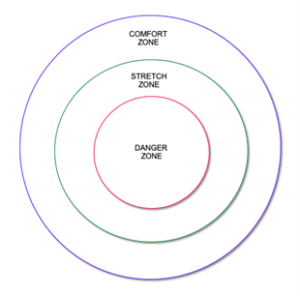by Dr. R.A. Weigel
Psalm 119:73 (ESV) – Your hands have made and fashioned me; give me understanding that I may learn your commandments.
“Learning is never full.” It’s a phrase I’ve used for many times over the years. It started when I was working with teachers, and we would do the Zones of Comfort exercise. That’s a simple protocol where I would set up three concentric circles called the Comfort Zone, Stretch Zone, and Danger Zone. I would then ask a series of questions and each person in the group was to move inside the circle that best fit their answer. The questions had varying degree of un-comfortability, pushing each person to  move from one circle to the next. After a series of questions, I would explain the purpose for the protocol. “The Comfort Zone is where you’re comfortable with your routine, effort, and work. The Stretch Zone has different degrees of un-comfortability but with some effort, encouragement, and some additional learning, you can do it. The Danger Zone is just that, dangerous, and learning won’t alleviate the danger you feel. The purpose of this protocol is for you to gain new insights because in reality, there is no personal growth outside of your Stretch Zone.”
move from one circle to the next. After a series of questions, I would explain the purpose for the protocol. “The Comfort Zone is where you’re comfortable with your routine, effort, and work. The Stretch Zone has different degrees of un-comfortability but with some effort, encouragement, and some additional learning, you can do it. The Danger Zone is just that, dangerous, and learning won’t alleviate the danger you feel. The purpose of this protocol is for you to gain new insights because in reality, there is no personal growth outside of your Stretch Zone.”
We all wish learning was simple, but it’s not. We see movies like The Matrix where the characters can download what they want to know and there’s no real effort involved. But learning doesn’t work like that. Learning can be very uncomfortable because it happens outside of your comfort zone. Learning, (stretching out of your routine), can be demanding, unsettling, awkward, annoying, and even painful at times. Yet, when you rely on the Holy Spirit to help you gain what you need in order to learn, you can move that skill, idea, or challenge from Stretch to Comfort fairly quickly. That makes the learning process exhilarating, satisfying, encouraging, and uplifting because once you’ve conquered that new skill or idea, once something is learned, it feels right.
From the beginning, God designed the human animal to learn. As a Christian, no matter how many years you have during your time on earth, there will always be more to learn and with God’s help, you’ll keep learning more of what is true, honorable, just, pure, lovely, commendable, excellent, and worthy of praise. (Philippians 4:8)
To say that some things are worth learning and other things are not worth learning may be too simplistic a statement. Clearly, not everything that can be learned has merit. In truth, there are many things that can be learned that are incredibly harmful for you physically, mentally, or spiritually because there has always been and will always be, individuals who promote learning opportunities that are aligned with purposes of evil. Jesus warned you about learning from them when he said, (Matthew 10:28 (ESV)) “And do not fear those who kill the body but cannot kill the soul. Rather fear him who can destroy both soul and body in hell.”
Your Desire To Know
The art of learning begins with an individual’s “desire to know.” It’s hard to maneuver around anyone’s lack of “desire to know.” When I was teaching school, there was always a cadre of kids who were fully uninterested in what the typical education system had to offer. They still had a “desire to know” but not a desire to know what the school system was offering. Many of those kids were more focused on the skills to get a job, a way to feel accepted by their peers, or finding a success that was not associated with what was being taught in the traditional setting. That’s why my classes and how I presented, was never traditional.
“We already know enough to successfully teach all children whose education is important to us. We already know more than we need to do that. Whether or not we do it must finally depend on how we feel about the fact that we haven’t so far.” ~ Ron Edmonds
One more aspect of an individual’s “desire to know” is when learning is forced or coerced through intimidation, fear, pressure, or even falsely framing the conditions for learning. There has always been certain locations, cultures, and people that frame the learning processes based on lies, corruption, deceit, pretense, or evil intent. A better framework for learning will always be one that’s based on God’s word and founded on truth, curiosity, interest, questioning, devotion, allegiance, desire, stewardship, and a framing of the learning conditions to inspire the student to want to know more. The best framework for learning will be structured on God’s love because God’s love has always been and always will be the greatest motivator for learning.
Matthew 11:29 (ESV) – Take my yoke upon you, and learn from me, for I am gentle and lowly in heart, and you will find rest for your souls.
Time is another important factor in the art of learning with some things taking a great deal of time and other things taking much less time. Time is an extremely precious commodity that God has given you. You don’t own time, you steward it. God owns time and He expects you to use it well! That’s why the time you spend to learn something requires you, as a Christian, to be prepared, put forth your best effort, have clarity of expectations, finish what you start. After all, time is not only physical, but it’s also spiritual. (Ephesians 5:16 (ESV) – making the best use of the time, because the days are evil.)
Time is the only commodity we deal with which cannot be counterfeited, stolen or placed in inventory. Remember, time is irreplaceable. ~ Zig Zigler
Purpose is another important element of the art of learning. At every juncture of life there will be things that you need or want to know for a purpose that is unique to you. There should always be a purpose behind your “desire to know” and by being clear on that purpose, then you can determine how much time you’re willing to commit to that learning. You frame your “desire to learn” based on purpose and time.
Many persons have a wrong idea of what constitutes true happiness. It is not attained through self-gratification but through fidelity to a worthy purpose. ~ Helen Keller
God’s Design For Learning
As children grow, they learn many things from both their environment and the people in their lives. Much of a child’s earliest learning is for both survival and to conform with the culture and/or people who are supporting their life. But there are multiple points in the life of a child when they begin to ask a lot of questions. God created the human mind to have curiosities and interests. God designed within every child, the art of asking questions. The multiple questioning periods in the life of a child are that child’s effort to build understanding. Initially, children ask questions based only on what they already know or the culture in which they live. But there comes a time when they begin to ask questions that are greater than their culture, more extensive than what they already know, and beyond simply the need to survive. Mankind was created by God with a desire to know God, which is why children will eventually begin asking questions that are rooted in the very fabric of human existence.
God designed people to learn! First and foremost, God designed people to learn about Him and asking good questions is an essential part of His original design. Great learning begins with the skill of asking the right questions. It’s an essential part of the “art of learning.”
ABOUT THE AUTHOR: Dr. Rich Weigel has an extensive background in leadership with over twenty years leading school districts. In addition to being a credentialed Leadership and Visioneering coach, he has been an adjunct professor five times in various universities teaching Strategic Leadership, Business Ethics, and Educational Leadership. He and his team provide support, coaching, and professional development for teams and leaders in schools and businesses around the country. Rich has served as CCNI’s President since January 2020. He can be reached at proedcoach@gmail.com.




